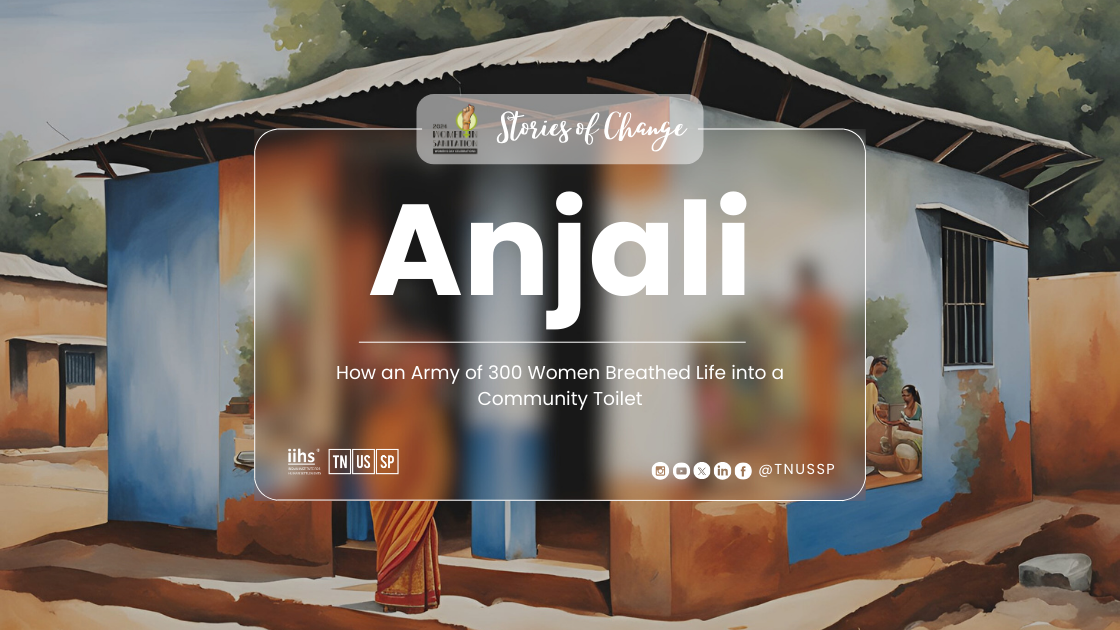Stree, Amman, Idhayangal, Ganga, Yamuna, Saraswati… these are just a few of the federations Anjali helped establish over 20 years. Anjali, who completed her education up to the tenth grade, was a homemaker who spent her days caring for her family, ensuring all their needs were met. When she managed to catch moments of rest between household chores, she watched the world outside, especially the women carrying smart handbags headed purposefully to their workplaces. Feelings of envy and regret would pass through her but Anjali would brush them off and return to the demands of her home.
Her husband soon began to notice Anjali’s longing for a career. She confessed to wanting more than her current life, and a desire to become independent, accomplished, and a role model for her children. Anjali’s husband fully believed in her abilities, and with his support, she launched her first federation. Once her community became privy to the efficiency with which Anjali ran her organisation, the demand for its services climbed, presenting the opportunity for expanding and multiplying operations. In two decades, Anjali kickstarted 21 federations. “I used to be the leader of one… Now I am the leader of 21 federations,” she says, still in disbelief. Anjali went on to register 14 of these federations as an Area Level Federation (ALF) – of which she also serves as President – in the National Urban Livelihoods Mission.
One day, in 2022, an unusual proposal came their way, leaving Anjali and her employees surprised and conficted. Impressed by their many successes, the Indian Institute for Human Settlements (IIHS) and the Greater Chennai Corporation (GCC) approached the ALF regarding the maintenance of the Velachery Public Toilet (PT). This proposal was met with a mixture of emotions, the chief among them being astonishment, disgust, and apprehension. Anjali and her team were unfortunately not immune to the deep-seated social taboos regarding sanitation work. They knew that if they took on the maintenance of the toilet, they would have to brave disapproval and ridicule from their family and community.
Although sceptical, the women did not immediately dismiss the idea but instead took the time to discuss the pros and cons of this work. Through this dialogue-building, the women became conscious of their biases and the need to be free of them. “The issue with such work is one of prestige. It took some time to make the women understand,” says Anjali. In the end, Anjali’s team decided to challenge the stigma surrounding sanitation work by accepting this unconventional offer. Anjali adds, “I have to credit my husband and children. If not for them, I would have said no.” On June 9, 2022, the women officially took charge of the TNHB colony public toilet, Velachery, Chennai.
At the onset, they faced numerous challenges. They had to quickly learn the ins and outs of toilet maintenance, pick up the basics of accounting, and get trained on ensuring a safe and inclusive experience for users. “In the beginning, we got only 50 users per day,” notes Anjali, “The staff were also new to the job so they faced many troubles. We had converted the derelict toilet into a clean and well-maintained one but we did not know how to attract users.” However, Anjali and her team let their work speak for itself. Soon, 50 users grew to 500 per day. The toilet became particularly popular among delivery executives, auto drivers and street vendors. “Many delivery executives from Swiggy, Uber etc. use this toilet. They say they prefer it because it is so well-maintained. I wonder where they used to go before…,” she sympathises. Anjali’s team also collaborated with IIHS and GCC to set up innovative feedback mechanisms and sustainable procurement strategies, ensuring the long-term viability of the facilities and making them accessible to all.
Anjali reveals there is one blemish in this line of work—several users are inebriated men who dirty the toilet and hurl insults at the staff. “This really hurts their feelings. You have to remember that these women were previously homemakers. They are not at all used to dealing with strangers or harsh criticism,” she admits. “But we haven’t backed down. We are trying to raise awareness and change this behaviour. It was very challenging, but I would say 75% change is done.”
Despite such obstacles, Anjali’s vision is clear: to provide hygienic and safe sanitation facilities free of charge to all residents, irrespective of their socioeconomic status. In recent times, this dependable, service- and results-driven maintenance model, steered entirely by women, has seen a rise in scale-up and set a precedent for clean and accessible sanitation nationwide. In short, Anjali’s story is not just about toilets; it’s about community empowerment, gender equality, and the transformative power of grassroots initiatives.
“Now I carry a handbag to work too, just like the women I used to admire. I have become so busy that I don’t have time at home or for rest,” Anjali laughs, “But it’s alright. I will work to make a difference until I can. After all, 300 women depend on me.”
About Women In Sanitation’s Stories of Change
IIHS-TNUSSP’s Women in Sanitation is a year-long initiative celebrating the invaluable contributions of women professionals in India’s sanitation sector. Now in its fifth year, we continue to amplify the often-overlooked voices of women who play diverse roles across the sanitation chain through impactful articles and films.
Introducing “Stories of Change,” a vibrant new addition to our campaign that unveils the poignant narratives of Tamil women who are shaping the sanitation landscape. Dive into their personal triumphs and discover the profound impact they bring to their communities. If you know of someone whose story deserves recognition, reach out to us at tnussp@iihs.ac.in.
Acknowledgements
Written and Designed by Suhasini Udayakumar, External Consultant – Communications, IIHS


Leave A Comment
You must be logged in to post a comment.